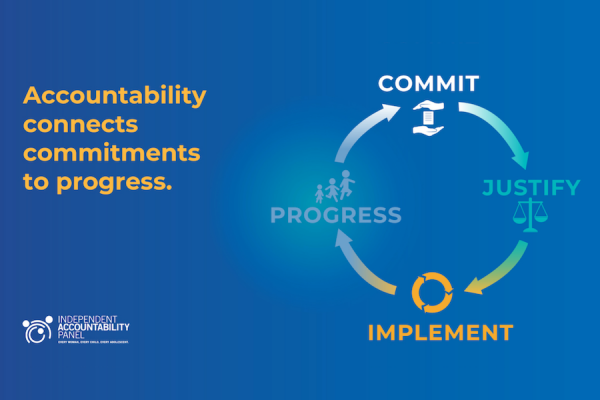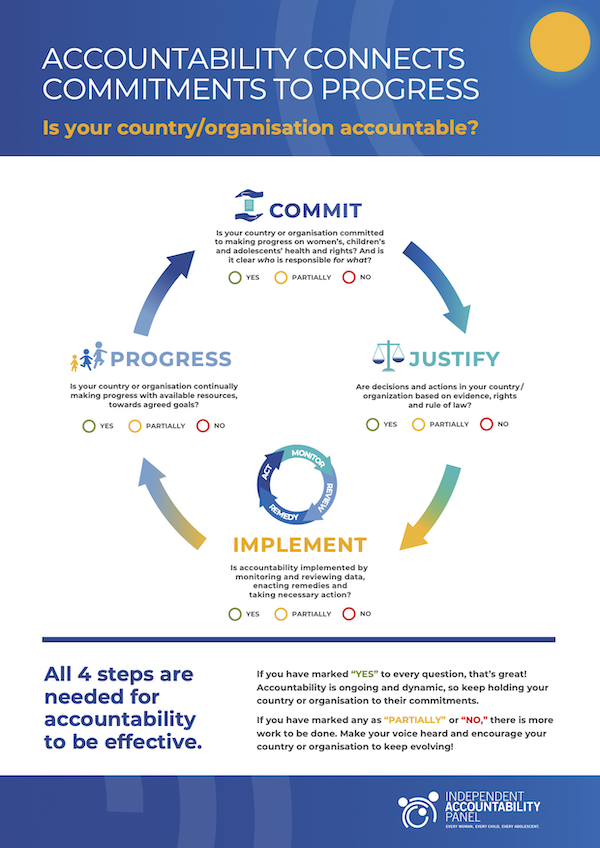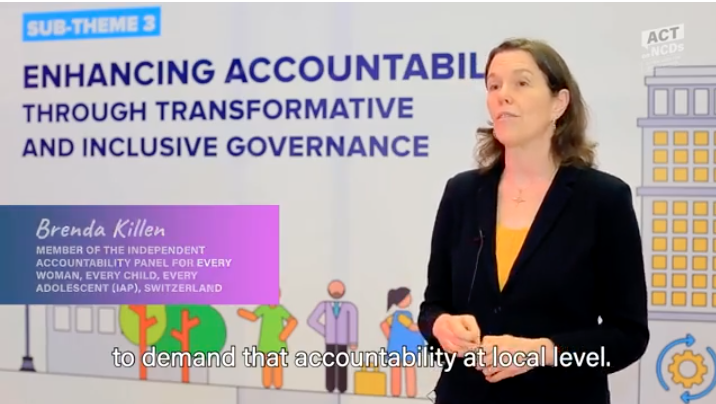Earlier this year I was pleased to join members of the NCD community – including over 400 members of civil society - at the 3rd Global NCD Alliance Forum in Sharjah. I was even more pleased that accountability was a major theme of the conference.
I am a member of the UN Secretary General’s Independent Accountability Panel for Every Woman Every Child, and we advocate for independent accountability at local and global levels to reach our global commitments to women, children and adolescents. We have found that, far too often, accountability is neglected or treated as an afterthought. But accountability is one of the most powerful levers we have to ensure that gains can be sustained. Leaving accountability out at the design stage leads to project failure
The IAP framework advocates a cycle of monitoring, review, remedy and action at country level, backed up by accountability systems at global level. The quality of each of these elements is important:
- Monitoring: Tracking and data collection are key. Yet, for the Global Strategy, we have found there are often limited links between the commitments in the strategy, what gets monitored, and what partners are implementing. Meanwhile local data collection and reporting is often weak and inconsistent.
- Review: It is crucial that there is an independent review of what is happening to ensure greater scrutiny of laws, policies, and identification of processes that are (or are not) working. ‘Data alone doesn’t tell the whole story.’
- Remedy (and Action): When things are not being done well, remedial action is needed. However, we have found a lack of research into remedial approaches such as budget allocations, judicial grievance mechanisms, social participation mechanisms etc. And yet these approaches are essential for trust and sustained process.
Accountability is strongest when it is institutionalised - ingrained as the foundation for every decision and policy for all stakeholders. Furthermore, the custodians of accountability need to be supported - parliament, civil society, academy, independent media, communities, individuals. We also need strong legal and institutional frameworks and governance structures.
Donors are also important for accountability - they can help to keep NCDs on the ‘front burner’ by demanding reporting and progress - and a return on donor investments. Donors can also help to promote mutual accountability exercises, which are especially useful where there is limited space for civil society. And parliamentarians can play a strong role through cross-party parliamentary groups and annual parliamentary debates on NCDs, especially if this is linked to the budget process.
Clearly in the field of NCDs, the private sector is a major partner for progress. But some corporate interests are conflicted and may undermine health. Unfortunately, there isn’t an effective system to engage the business sector in accountability on health and other development goals. The IAP included some recommendations in our report Private Sector: Who is Accountable? in 2018. For example, given that businesses must operate within national law and be accountable to their shareholders, there are entry points for civil society to call businesses to order - as voters, shareholders and consumers.
For civil society and the general public to be more actively engaged in accountability, they need to understand what commitments have been made and who is responsible to deliver these. Communities need better information on their rights as consumers, and how marketing may undermine these. Civil society advocates have an important role to play here in exposing and informing the wider public as citizen surveilers – leveraging their rights as citizens, voters, consumers, shareholders, social media users and informants.
Accountability doesn’t need to be a baffling. Civil society is made up of voters, shareholders, consumers - all of whom have a role in building strong accountability systems for health and rights. And – as many voices are stronger than one - the NCD Alliance is a powerful community to hold government and business to account for their commitments and responsibilities to make health - and the world - better.
Brenda Killen is a member of the Independent Accountability Panel for Every Woman Every Child. This blog is an adaptation of her plenary keynote on accountability delivered at the 3rd Global NCD Alliance Forum held in Sharjah in February 2020. Hear more from Brenda on accountability in this year's campaign video on the theme of accountability.






